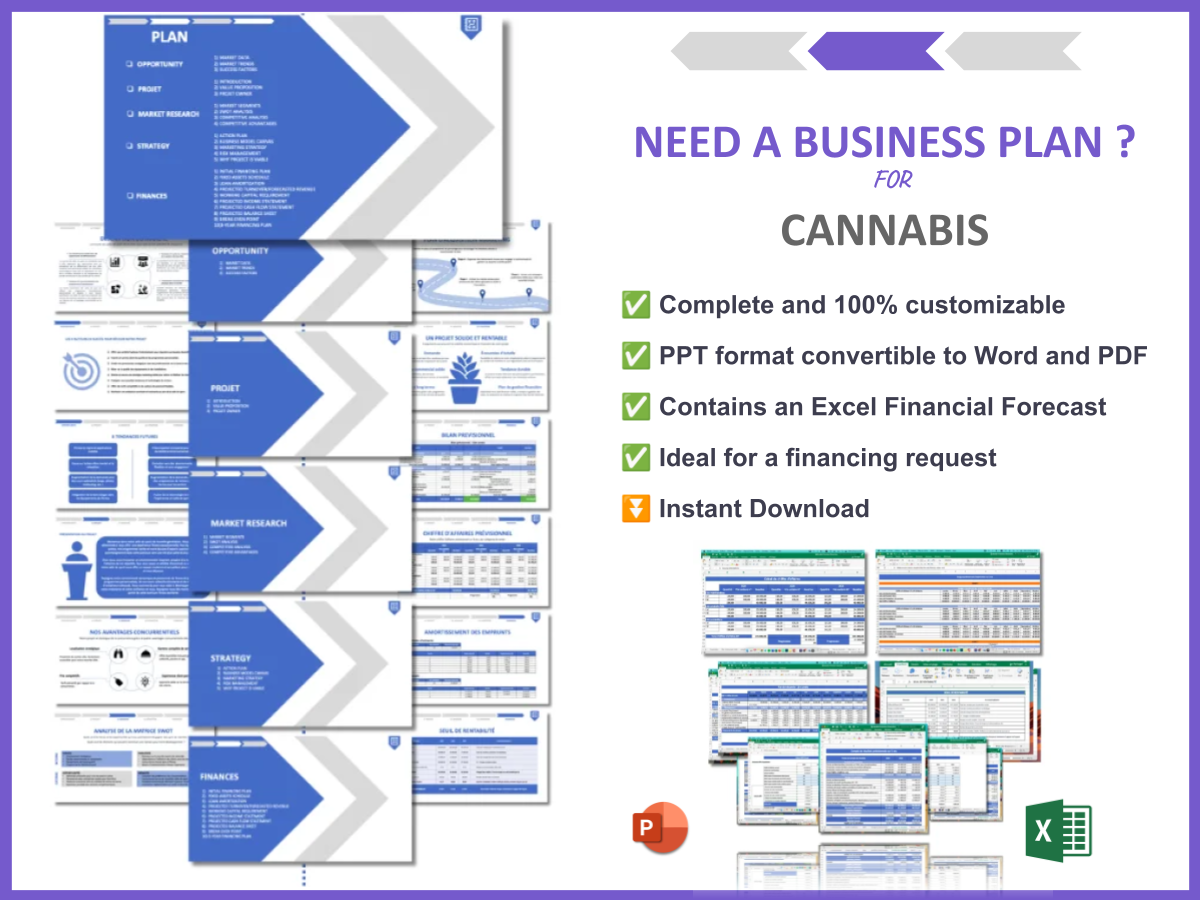Are you thinking about starting a cannabis business? You’re not alone! The cannabis industry has exploded in popularity, with more and more entrepreneurs eager to join the green rush. Did you know that the legal cannabis market is projected to reach over $40 billion by 2025? This rapid growth presents a golden opportunity for anyone looking to launch their own cannabis business. In this guide, we will cover everything you need to know about how to start a cannabis business, from developing your business idea to marketing your products effectively.
- Understanding the cannabis industry and its potential.
- How to develop and refine your cannabis business idea.
- Conducting essential market research for your cannabis business.
- Creating a detailed business plan for your cannabis venture.
- Choosing the right legal structure for your cannabis business.
- Securing funding and financial resources for your cannabis startup.
1. What is the Cannabis Industry and Why Start a Cannabis Business?
The cannabis industry is a rapidly growing sector that encompasses various aspects, including cultivation, distribution, retail, and product development. As legalization spreads across various states and countries, the demand for cannabis products continues to rise. If you’re considering entering this exciting field, here are a few reasons why starting a cannabis business might be the right move:
- High Demand: With more states legalizing cannabis for recreational and medicinal use, the demand for quality products is at an all-time high.
- Diverse Opportunities: The cannabis market is diverse, offering opportunities in various areas such as retail, e-commerce, cultivation, and product innovation.
- Social Impact: Many entrepreneurs are drawn to the cannabis industry because it allows them to contribute positively to their communities, providing jobs and supporting local economies.
Starting a cannabis business not only has the potential for financial gain but also allows you to be part of a revolutionary industry that is changing perceptions and policies surrounding cannabis.
2. How to Develop and Refine Your Cannabis Business Idea?
Before you dive into the logistics of starting a cannabis business, it’s crucial to develop a solid business idea. Here are some steps to help you refine your concept:
- Identify Your Passion: Think about what aspects of the cannabis industry excite you the most. Are you interested in cultivation, retail, or perhaps creating cannabis-infused products? Your passion will drive your business.
- Research Trends: Stay informed about current trends in the cannabis market. What products are gaining popularity? What gaps exist in the market? This research can help you identify a unique niche.
- Define Your Target Audience: Who are your potential customers? Understanding your audience is key to shaping your business model and marketing strategies.
Here’s a simple table to help you organize your thoughts:
| Aspect | Details |
|---|---|
| Passion | What excites you about cannabis? |
| Trends | What products or services are currently in demand? |
| Target Audience | Who will benefit from your business? |
By systematically evaluating these aspects, you can hone in on a business idea that not only aligns with your interests but also meets market needs. Remember, the more refined your idea is, the easier it will be to develop a comprehensive business plan!
3. What Market Research is Essential for Starting a Cannabis Business?
Market research is a critical step in launching your cannabis business. It helps you understand the landscape of the industry, identify your competitors, and spot potential customers. Here’s how to conduct effective market research:
- Identify Your Competitors: Look for businesses that offer similar products or services. Analyze their strengths and weaknesses, pricing strategies, and marketing approaches.
- Understand Customer Preferences: Conduct surveys or interviews to gather insights on what potential customers are looking for in cannabis products. This will help you tailor your offerings to meet their needs.
- Analyze Industry Trends: Stay updated on trends and changes in regulations that could affect the cannabis industry. Websites like industry reports and cannabis trade publications can provide valuable information.
To better visualize your findings, consider creating a comparison table that highlights your competitors and their offerings:
| Competitor | Products Offered | Pricing | Strengths | Weaknesses |
|---|---|---|---|---|
| Green Leaf Dispensary | Flower, Edibles, Oils | Moderate | Strong brand presence | Limited product variety |
| High Times Co. | Flower, CBD products | High | Premium quality | Higher price point |
| Happy Herb Co. | Edibles, Topicals | Low | Affordable | Less brand recognition |
This structured approach will not only help you understand the competitive landscape but also inform your decisions as you develop your cannabis business.
4. How to Create a Detailed Business Plan for Your Cannabis Business?
A detailed business plan is essential for any successful cannabis business. It serves as your roadmap and can be crucial when seeking funding or partnerships. Here’s how to create one:
- Executive Summary: Begin with an overview of your business, including your mission statement, business objectives, and the products or services you plan to offer.
- Market Analysis: Summarize your market research findings, including target demographics, market trends, and competitive analysis.
- Marketing Strategy: Outline how you plan to promote your business. Consider digital marketing, social media, and community outreach.
- Operational Plan: Describe the day-to-day operations of your business, including location, suppliers, and staffing needs.
- Financial Projections: Include detailed financial forecasts, such as expected revenue, expenses, and profitability over the next few years.
For those who may need assistance with this step, I recommend checking out this business plan template for Cannabis. It’s super detailed and can save you a ton of time!
Creating a comprehensive business plan may seem daunting, but it’s an invaluable tool that will guide you as you navigate the complexities of starting a cannabis business. Plus, having a solid plan in place can significantly increase your chances of securing funding and support!
5. What Legal Structure Should You Choose for Your Cannabis Business?
Choosing the right legal structure is crucial for your cannabis business as it affects your taxes, liability, and overall operational framework. Here are the most common legal structures to consider:
- Sole Proprietorship: This is the simplest form, where you operate your business alone. However, it offers no personal liability protection.
- Limited Liability Company (LLC): An LLC provides personal liability protection and is a popular choice for cannabis businesses. It allows for flexibility in management and tax treatment.
- Corporation: A corporation is a more complex structure that offers strong liability protection. However, it requires more paperwork and compliance obligations.
It’s essential to weigh the pros and cons of each structure. Here’s a table summarizing the key features:
| Legal Structure | Liability Protection | Tax Implications | Complexity |
|---|---|---|---|
| Sole Proprietorship | No | Personal income tax | Low |
| Limited Liability Company (LLC) | Yes | Pass-through taxation | Moderate |
| Corporation | Yes | Corporate tax | High |
Consulting with a legal expert who specializes in the cannabis industry can help you make an informed decision about which structure is best for your business.
6. How to Secure Funding for Your Cannabis Business?
Securing funding for your cannabis business can be challenging, given the unique legal landscape surrounding cannabis. Here are several strategies to consider:
- Personal Savings: Many entrepreneurs start by using their savings. This option allows you to maintain full control but can be risky.
- Investors: Look for investors who are interested in the cannabis market. Present your business plan to potential investors to secure funding.
- Crowdfunding: Platforms like Kickstarter and Indiegogo can help you raise funds by pre-selling your products or offering rewards.
- Bank Loans: Traditional banks may be hesitant to lend to cannabis businesses, but some are beginning to offer loans. Research local banks that are open to financing cannabis ventures.
To better understand your funding options, consider this breakdown:
| Funding Source | Advantages | Disadvantages |
|---|---|---|
| Personal Savings | Full control | High risk |
| Investors | Access to capital | Shared ownership |
| Crowdfunding | Market validation | Time-consuming |
| Bank Loans | Lower interest rates | Limited availability |
By exploring multiple funding sources, you can increase your chances of securing the necessary capital to launch your cannabis business. Be prepared with a solid business plan and a clear vision to attract potential investors and lenders.
7. What Steps to Register Your Cannabis Business Officially?
Once you have your business idea and plan in place, it’s time to make your cannabis business official. Registering your business is a crucial step that involves several key actions:
- Choose a Business Name: Select a unique name that reflects your brand and complies with your state’s regulations. Make sure to check for trademark availability.
- File for Registration: Depending on your legal structure, you’ll need to file the appropriate paperwork with your state’s business registry. This could involve submitting articles of incorporation or organization.
- Obtain an Employer Identification Number (EIN): An EIN is essential for tax purposes and is often required to open a business bank account. You can apply for an EIN through the IRS website.
- Open a Business Bank Account: Keep your business finances separate from your personal finances by opening a dedicated bank account for your cannabis business.
Here’s a quick checklist to help you through the registration process:
| Step | Details |
|---|---|
| Choose Business Name | Ensure it’s unique and compliant |
| File for Registration | Submit necessary paperwork |
| Obtain EIN | Apply through the IRS |
| Open Business Bank Account | Keep finances separate |
Completing these steps will help you establish your cannabis business legally, ensuring that you’re on the right track as you move forward.
8. How to Obtain Necessary Licenses and Permits for Your Cannabis Business?
Obtaining the necessary licenses and permits is one of the most critical steps in starting a cannabis business. The requirements can vary significantly by state and local jurisdiction, so it’s essential to do your research. Here’s how to navigate this process:
- Understand Local Regulations: Each state has its own laws regarding cannabis. Research your state’s regulations to determine what licenses you need for your specific business model, whether it’s retail, cultivation, or manufacturing.
- Prepare Your Application: Gather all necessary documents, such as your business plan, financial projections, and proof of compliance with local zoning laws. Many states require detailed information about your operations.
- Submit Your Application: Apply for the required licenses through your state’s regulatory body. Be prepared for background checks and possibly a lengthy review process.
- Stay Compliant: Once you’ve obtained your licenses, ensure you comply with all regulations to maintain them. This includes regular reporting and adhering to operational guidelines.
To give you a clearer understanding, here’s a table outlining common licenses you might need:
| License Type | Description |
|---|---|
| Retail License | Allows you to sell cannabis products directly to consumers. |
| Cultivation License | Permits you to grow cannabis plants. |
| Manufacturing License | Enables you to produce cannabis-infused products. |
| Distribution License | Allows you to transport cannabis products between businesses. |
Securing the right licenses and permits is essential for the legitimacy and success of your cannabis business. Make sure to stay informed about any changes in regulations to avoid any legal issues down the road.
9. What Business Insurance Do You Need for Your Cannabis Business?
Insurance is a crucial aspect of running any business, and your cannabis business is no exception. The cannabis industry faces unique risks, so having the right coverage is essential. Here are some types of insurance you should consider:
- General Liability Insurance: This covers claims related to bodily injury, property damage, and personal injury. It’s essential for protecting your business from lawsuits.
- Product Liability Insurance: If you’re selling cannabis products, this coverage protects you against claims that your products caused harm to consumers.
- Property Insurance: This insurance covers your physical assets, including your building, equipment, and inventory, against risks like theft, fire, or natural disasters.
- Workers’ Compensation Insurance: If you have employees, this coverage is typically required. It protects against claims related to workplace injuries.
Here’s a helpful table summarizing the types of insurance you may need:
| Type of Insurance | Coverage |
|---|---|
| General Liability | Covers bodily injury and property damage claims |
| Product Liability | Protects against claims from product-related injuries |
| Property Insurance | Covers physical assets against theft or damage |
| Workers’ Compensation | Protects against workplace injury claims |
Before selecting an insurance provider, it’s wise to shop around and compare quotes. Consulting with an insurance agent who specializes in the cannabis industry can help you find the right coverage tailored to your specific needs. Having adequate insurance will give you peace of mind and protect your investment.
10. How to Set Up Financial Management Systems for Your Cannabis Business?
Effective financial management is critical for the success of your cannabis business. Properly tracking your income and expenses can help you make informed decisions and ensure compliance with tax regulations. Here’s how to set up your financial management system:
- Choose Accounting Software: Select an accounting software that suits your business needs. Popular options include QuickBooks, FreshBooks, and Xero. These tools can help you manage invoices, track expenses, and generate financial reports.
- Set Up a Budget: Create a detailed budget that outlines your expected income and expenses. This will help you monitor your financial performance and identify areas where you can cut costs.
- Implement a Payment Processing System: Since traditional banks may be hesitant to work with cannabis businesses, consider using specialized payment processors that cater to the cannabis industry.
- Keep Accurate Records: Maintain thorough records of all transactions, including sales, expenses, and tax documents. This will make tax season much easier and help you stay compliant with regulations.
To illustrate the financial management components, here’s a simple breakdown:
| Financial Component | Description |
|---|---|
| Accounting Software | Tracks income and expenses |
| Budget | Forecasts financial performance |
| Payment Processing | Handles customer transactions |
| Record Keeping | Maintains transaction history |
By implementing a solid financial management system, you can ensure the sustainability and growth of your cannabis business. This will not only help you make better financial decisions but also prepare you for potential audits or compliance checks.
11. How to Establish Your Brand Identity in the Cannabis Market?
Creating a strong brand identity is essential for your cannabis business. A well-defined brand helps you stand out in a crowded market and connect with your target audience. Here are steps to establish your brand:
- Define Your Brand Values: Determine what your business stands for. Are you focused on sustainability, quality, or community engagement? Your values should resonate with your target audience.
- Create a Unique Logo and Visuals: Design a memorable logo and select a color palette that reflects your brand’s personality. Consistent visuals will help strengthen brand recognition.
- Develop a Brand Voice: Your brand voice should reflect your values and appeal to your audience. Whether it’s friendly, professional, or edgy, maintain a consistent tone across all communications.
- Engage with Your Audience: Utilize social media platforms to interact with customers. Share educational content, promotions, and behind-the-scenes looks at your business.
Here’s a helpful table summarizing key elements of brand identity:
| Element | Description |
|---|---|
| Brand Values | Core principles that guide your business |
| Visuals | Logo, colors, and design elements |
| Brand Voice | Consistent tone in communications |
| Audience Engagement | Interacting with customers through social media |
Establishing a solid brand identity will not only attract customers but also foster loyalty and trust in your cannabis business.
12. How to Market and Advertise Your Cannabis Business Effectively?
Marketing your cannabis business can be challenging due to strict regulations, but there are effective strategies you can implement. Here’s how to create a successful marketing plan:
- Utilize Social Media: Platforms like Instagram and Facebook are great for showcasing your products. Share high-quality images and engaging content to attract followers.
- Content Marketing: Start a blog on your website to share informative articles about cannabis, industry news, and product tips. This will position you as an expert and drive traffic to your site.
- Email Marketing: Build an email list to keep your customers updated on promotions, new products, and events. Personalized emails can help foster a deeper connection with your audience.
- Local Partnerships: Collaborate with local businesses or events to increase your visibility. Sponsoring community events can also enhance your reputation and reach.
Here’s a simple table outlining effective marketing strategies:
| Strategy | Description |
|---|---|
| Social Media | Showcase products and engage with customers |
| Content Marketing | Share informative articles to drive traffic |
| Email Marketing | Update customers on promotions and news |
| Local Partnerships | Collaborate to enhance visibility |
By implementing these marketing strategies, you can effectively promote your cannabis business and reach your target audience, even in a competitive market.
13. How to Assemble Your Team for a Successful Cannabis Business?
Building a strong team is vital for the success of your cannabis business. The right people can help you navigate challenges and drive growth. Here’s how to assemble your team:
- Identify Key Roles: Determine what positions are essential for your business. Common roles in the cannabis industry include budtenders, marketing specialists, and compliance officers.
- Look for Industry Experience: Seek candidates with experience in the cannabis sector. Knowledge of regulations and market trends can significantly benefit your business.
- Foster a Positive Culture: Create a workplace environment that encourages collaboration, creativity, and inclusivity. A positive culture can attract top talent and improve retention rates.
- Provide Training and Development: Invest in your team’s growth by offering training programs. This not only enhances their skills but also shows that you value their contributions.
To help visualize the team structure, here’s a basic breakdown of potential roles:
| Role | Responsibilities |
|---|---|
| Budtender | Customer service and product knowledge |
| Marketing Specialist | Develops marketing strategies and manages campaigns |
| Compliance Officer | Ensures adherence to laws and regulations |
| Operations Manager | Oversees daily business activities |
Assembling a dedicated and skilled team will set your cannabis business up for success. Invest in hiring the right people, and you’ll create a strong foundation for growth and innovation.
Conclusion
Starting a cannabis business can be an exciting and rewarding journey if you follow the right steps. From developing your business idea to navigating legal requirements and establishing a solid marketing strategy, each step is essential for your success. Remember to build a strong brand identity and assemble a capable team to support your vision. As you embark on this venture, consider exploring additional resources to enhance your knowledge and strategy. I highly recommend checking out our articles on how to create a SWOT Analysis for Cannabis and how to create a Cannabis Marketing Plan. These resources can provide you with valuable insights and tools to further strengthen your business approach.
FAQ
- What are the legal requirements to start a cannabis business?
To start a cannabis business, you must comply with local and state regulations, which typically include obtaining licenses, permits, and adhering to zoning laws. It’s crucial to research the specific requirements in your area. - How much capital do I need to start a cannabis business?
The amount of capital required can vary widely based on your business model (retail, cultivation, etc.). On average, starting a cannabis business can range from tens of thousands to millions of dollars, depending on your scale and location. - What types of cannabis businesses can I start?
You can start various types of cannabis businesses, including dispensaries, cultivation facilities, product manufacturing, and delivery services. Each type has its own set of regulations and market opportunities. - How do I conduct market research for my cannabis business?
Conducting market research involves identifying your target audience, analyzing competitors, and understanding industry trends. You can use surveys, interviews, and industry reports to gather valuable insights. - What are the best marketing strategies for cannabis businesses?
Effective marketing strategies for cannabis businesses include utilizing social media, content marketing, email campaigns, and forming local partnerships. Tailor your strategies to comply with advertising regulations specific to the cannabis industry. - How can I ensure compliance in my cannabis business?
Staying compliant involves keeping up-to-date with local laws, maintaining accurate records, and regularly reviewing your operations against regulatory requirements. Consider hiring a compliance officer to help manage these aspects. - What insurance do I need for my cannabis business?
Essential insurance types for a cannabis business include general liability, product liability, property insurance, and workers’ compensation. Each type protects against different risks associated with operating in the cannabis industry. - How do I create a business plan for my cannabis business?
A business plan should include an executive summary, market analysis, marketing strategy, operational plan, and financial projections. You can find templates and examples specifically for cannabis businesses to guide you. - What are the challenges of starting a cannabis business?
Challenges include navigating complex regulations, securing funding, establishing a reliable supply chain, and competing in a rapidly growing market. Being aware of these challenges can help you prepare effectively. - How can I find investors for my cannabis business?
To attract investors, develop a strong business plan, network within the cannabis community, and consider crowdfunding platforms that cater to cannabis ventures. Highlight the unique aspects of your business to pique interest.







